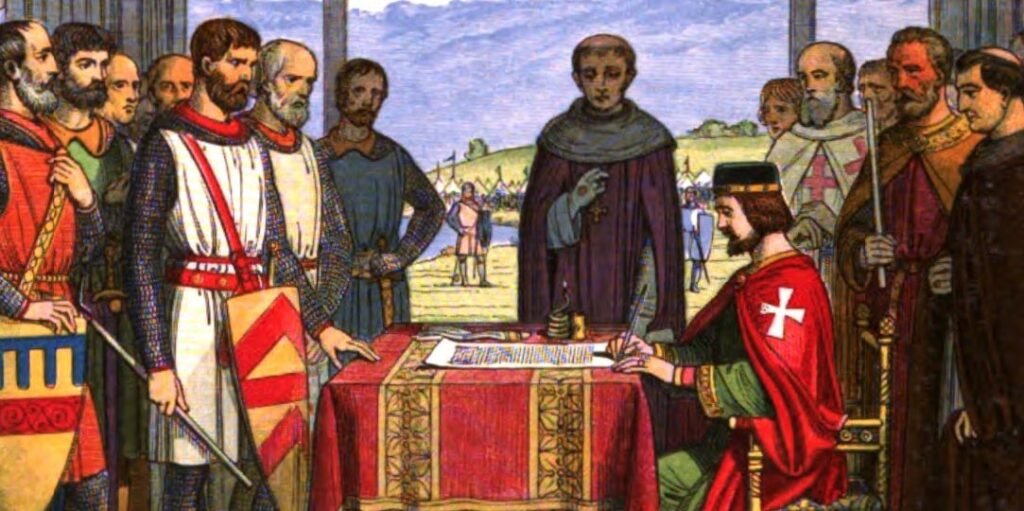
Bloodless revolutions are the exception, not the rule: in fact, history is full of wars in which different nations and regional groups pitted one another against one another over territory and other economic interests.
Survival of the fittest is not a theory but a reality for most of the world's history, and the slogan “might makes right” was in many places equated with the rule of law.
Blend these ideas with the concept of the divine right of kings and you get an arbitrary formula for government that changes at the whim of the ruler.
In many parts of the world, governments work this way: the most powerful ruler, politically or militarily, rules absolutely, and his or her decrees take precedence over all constitutions, laws, ordinances, proclamations, and resolutions.
But civilization has another tradition of prioritizing law over the unbridled discretion of any ruler, and of balancing government power so that power is dispersed and not concentrated in one place where it can be abused.
This tradition figured prominently 809 years ago in a small meadow called Runnymede, about 25 miles from London, where it is remarkable, if not miraculous, that in 1215 the seeds of constitutional government were planted in the written form of Magna Carta.
The idea that disagreements could arise between kings and subjects and that they could resolve the dispute in the form of a contract was a foreign idea. Usually, disputes with a ruler would result in dire consequences such as exile or, in the worst cases, death. It is amazing to think that over 800 years ago, reasonable people could come together, debate, reach an agreement and prepare a written settlement.
Thus, we can say that Magna Carta was the first expression of a bloodless revolution, and this revolution continues to have a profound impact from which we all benefit, as it played a role in creating rights at many levels.
The Magna Carta indirectly rejected the idea that the King of England was above the law and could do whatever he wanted. Instead, it created a kind of advise-and-consent balance of power by allowing the King some things within set limits, but requiring the consent of the nobles for any action beyond those limits.
Obtaining the consent of the nobles was not always easy, and after Magna Carta, Parliament developed into an institution to limit the power of the monarch.
But Magna Carta not only created and approved a political system, it also recognized and confirmed two guiding principles of civilization.
First, the agreement recognized that the king had unlimited revenue and could not raise taxes indiscriminately. Controlling the monarch's purse strings was perhaps one of the most important aspects of constitutional government, and the ability of parliamentary representatives to limit spending created a financial veto over any policies or initiatives the ruler might implement.
While certain policies could be hotly debated and their merits weighed, the immediate solution to the bottom line was to stop the flow of money into the royal coffers. Limiting the national treasury would force all monarchs and other rulers to prioritize their efforts and determine what was of vital importance.
In the 13th century, kings did not yet know how to devalue money or print paper money, so limiting the power to tax made it impossible for a monarch to mistreat his subjects by forcing them to support public works that they opposed. Limiting the power to tax remains a staple of representative governments and advanced civilizations.
Indeed, one of the features that encouraged the development of self-government was the various forms of protest against confiscatory taxes, when the people had no stake in approving the taxation or consenting to the expenditure of public funds.Magna Carta may justifiably be seen as the first in a long series of tax protests that limited the growth of revenue by confiscating property from the emerging middle class.
As if sparking the “no taxation without representation” movement wasn't enough, Magna Carta recognized and codified some of the earlier concepts Americans cherish as part of the Bill of Rights — a remarkable achievement for the Middle Ages — thus establishing a legal tradition of individual rights that many countries have yet to embrace, much less implement.
None of these rights were as advanced, widely implemented, or absolute as we would like them to be today, but it was a start, and a good start. As a written document, Magna Carta endorsed concepts that are now part of advanced civilization: an uncensored press, security of property, equality before the law, habeas corpus, regular elections, the sanctity of contracts, and trial by jury.
But like any contract or agreement between disputing parties, there needs to be a mechanism for enforcement; someone has to ensure that both sides abide by the agreement. To that end, Magna Carta provided that the barons could confiscate the king's property if the terms of the charter were violated.
Like most contracts today, they required the king to be notified of any breaches and given an opportunity to remedy or correct the breach, but could face confiscation of property if the king did not relent. The barons were required to pledge to support this coercive measure.
Thus, the nobility's loyalty became a duty to Magna Carta rather than a duty to the King. This concept is still expressed today in the American oath being to the Constitution rather than to an individual. Magna Carta was the beginning of the concept of loyalty to a contract of rights rather than to an individual.
While by no means perfect, Magna Carta was the first example of a bloodless revolution in which the rule of law and contractual rights led to the advancement of civilization and the beginnings of constitutional government.
Will Sellers is a graduate of Hillsdale College and a justice on the Alabama Supreme Court. He can be reached at [email protected].
do not miss it! Subscribe now Get the top Alabama news stories delivered to your inbox.







